We were big winners at the ContentEd 2023 Awards
At the annual ContentEd Awards ceremony, the Team won two awards, and our very own Neil Allison won an award for championing and elevating others working in content. In this post, I share one of our winning submissions, showcasing our great work.
About the conference and awards
ContentEd is an annual conference for content professionals in the higher ed sector. This year, they held their conference in Manchester, and Neil, Louis, Nicole, Cathy, and I travelled down to attend.
At the conference each year, they hold an awards ceremony for a number of different categories that teams submit their own nominations for.
What we won
I am proud to report that our team won for the two awards I wrote submissions for:
- Content team of the year
- Criteria: “This award recognises a team who are making excellent progress in setting the standards for strategic content leadership in their institution. The winning team will demonstrate excellent teamwork and evidence the impact of their work across the board.”
-
What the judges said: “I really appreciate the individual contributions and strengths – and also how more junior staff are being supported to flourish. They’ve worked collaboratively and consultatively to bring their community along with them”
- Best overall approach to content strategy and content design
- Criteria: “This award recognises an education institution that has made significant advances in their approach to content strategy and content design, transforming the way that they approach marketing and communications.”
-
What the judges said: “Their focus on collaboration, trust, and iterative development is commendable. The strategy is not only well-planned but also well-executed, involving multiple stakeholders to ensure its success.”
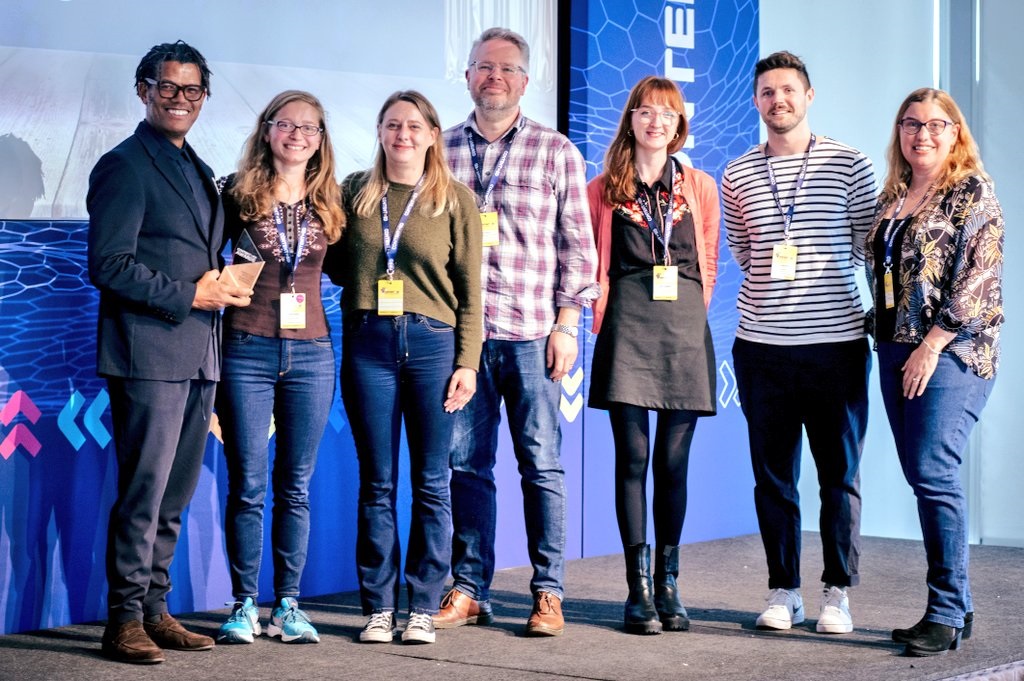
Nicole, Neil, Cathy, Louis and me accepting the award for Content team of the year. Not at the conference but whose work is recognised in the winning submissions: Freya, Flo, Heike and Jen.
The submissions focused on our work developing the new undergraduate degree finder. It’s been a big, challenging project that’s thrown all of our content designers into new territory. I’ve been so impressed with our team’s ability to tackle the new challenges we’ve faced during this project, so I’m incredibly honoured our efforts have been recognised with not one, but two awards.
Neil also won an award himself:
- Martin Bojam Award (judges award)
- Criteria: “The Martin Bojam award recognises an individual that is leading the way in championing, mentoring and elevating others within the content, communications and marketing professions in the education sector. The judges make their own nominations for this award and vote amongst them.”
-
What the judges said: “They have recruited and developed a team of early career professionals and empowered them to become some of the finest content designers in the sector. They have supported their team from having never worked on a content design project before, through to being conference speakers and thought leaders in our industry.”
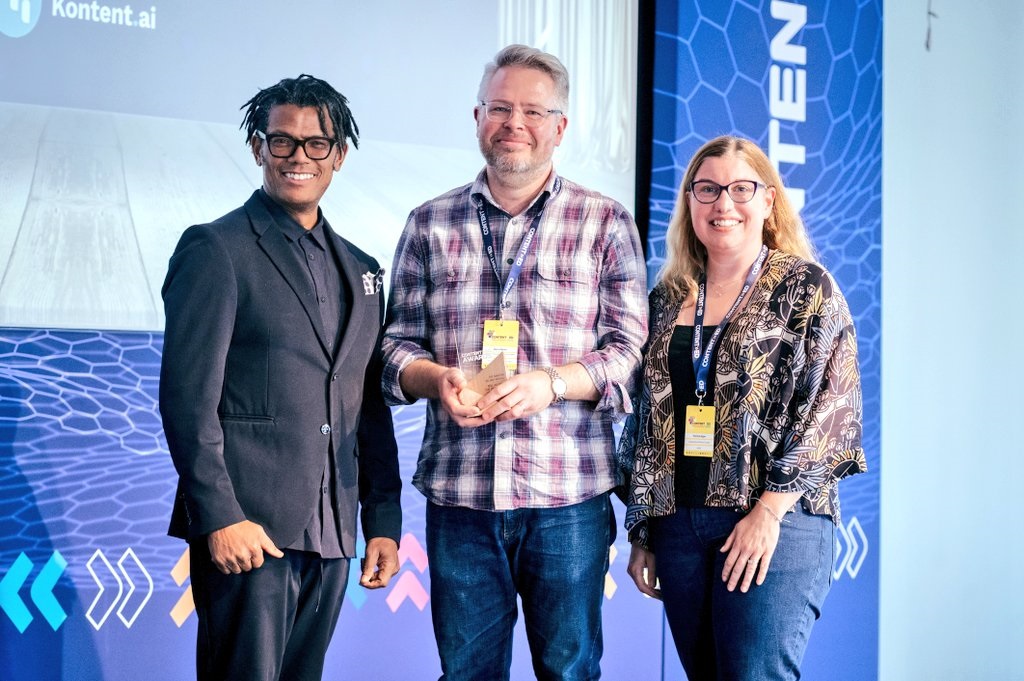
Neil accepting the Martin Bojam Award.
I can’t think of anyone more deserving of this award than Neil. Having worked with him for the past eight and a half years, I have seen and experienced just how much hard work and care he puts in to championing content designers, other human-centred professionals and the discipline itself at the University of Edinburgh.
I feel so privileged to be led by someone who is equally brilliant and kind, and who recognises the value of content and content professionals. I know plenty of content designers who don’t get that recognition and support, so I’m incredibly grateful to have come into content design through working with Neil and been able to learn so much from him.
He has so effectively championed, mentored and elevated me all these years that I now get to teach him a thing or two these days!
Building on our 2022 win
Last year we also came away from Content Ed with an award. It was only one last time though: The Empathy Award for Advancing Audience Research and Insight.
Our winning submission for Best overall approach to content strategy and content design
My submissions for Content team of the Year and Best overall approach to content strategy and content design have a lot of overlap, so I thought I’d share just one of the submissions, so you can read the great work we’ve done that won us these awards.
Creating a new undergraduate degree finder at the University of Edinburgh
Since autumn 2022, the University of Edinburgh Prospective Student Web Content team has been working to design a new undergraduate degree finder.
Through this project, we have shown great care and consideration in crafting an experience that better serves the needs of our prospective students and devolved editorial community.
Background
With our current degree finder CMS at end of life, we’ve embarked on a three-year project to develop a new CMS. The first year of the project has focused on creating the undergraduate degree finder experience.
Project highlights
Creating a content model
Our first task was to create a content model for undergraduate study, a task entirely new to us.
We audited our current degree finder, school websites and other university websites, to build a list of the different components that could make up our new content type. We then refined our list with our user researcher based on what was most important to prospective students.
We developed a super-detailed content model that became the bedrock of our project. After presenting the first iteration to our editorial community, we got a lot of great feedback for how detailed it was. It gave the community confidence in our design decisions. As a result, we never received any major concerns to any of our decisions throughout the project.

Snapshot of the content model.
Creating the prototype
Next, we created the undergraduate programme prototype, working with our UX Specialist. We met for collaborative design sessions to transform our content model into a visual reality. We’d create designs and conduct usability tests on the aspects we wanted to get user feedback on.
This constant iterative cycle of learning meant that we not only enhanced our content and design skills along the way, but that we designed something we know works for our audiences, and we’re incredibly proud of that.
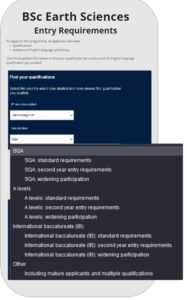
An initial wireframe we designed for how entry requirements would work.
Working with schools
As our degree finder is populated by a devolved group of school-based editors, we couldn’t have made a great product without them.
We had five keen contributors sign up to co-design with us. We ran a workshop where we showed them our initial designs and gave them the chance to prioritise which areas they’d like to help us develop.
We then led the co-design workshops with schools, where we got some great insights and design ideas on how to build certain components based on what the editors know about their audiences.
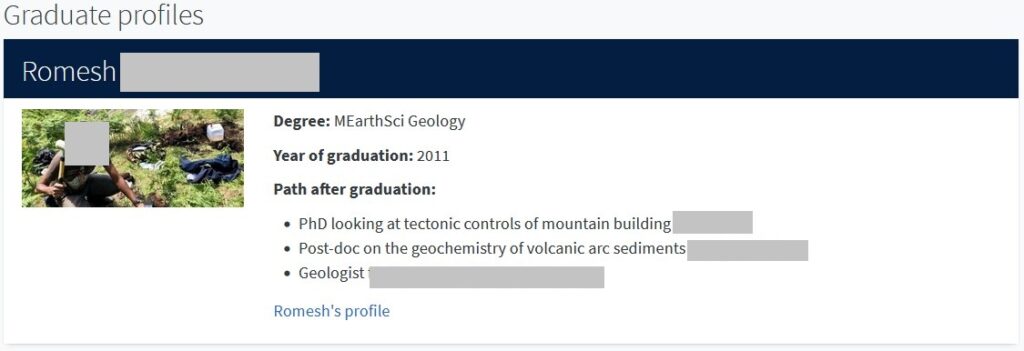
A component co-designed with school editors.
Planning the editorial experience
We also had to consider the future editorial experience for our school editors: do we continue using a third-party content operations platform (GatherContent) or develop the editorial experience in our new CMS?
While we were struggling to decide, we came up with a middle-ground solution: stick with GatherContent for one more year and then, in the second year, introduce editors into the new editorial experience we’d build in the CMS.
That way, we’re not overburdening school editors with lots of changes. We’re introducing the new experiences gradually and transitioning to a new approach.
Collaborating with admissions to design entry requirements
Our biggest design challenge was entry requirements. It’s a complex area where we had to design a better experience for both prospective students and admissions colleagues who gather requirements for nearly 400 programmes.
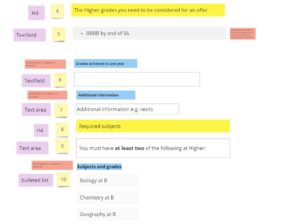
Snapshot of the backend mock-up for entry requirements.
We had our greatest stakeholder win in entry requirements when we convinced admissions to change the name of ‘minimum entry requirements’ to ‘widening access entry requirements’. We long knew this name to be an issue that led to many applicants wrongly assessing themselves as eligible for lower entry requirements than they were.
All it took was showing admissions one participant making this mistake in a usability test to convince them to talk to their senior management to make this change, and they agreed! In subsequent testing we did, no student ran into this issue. One small change had a massive impact improving our user experience.
Changing the University’s approach to content through trust
In a highly devolved institution like Edinburgh, it’s hard to create central systems that school colleagues get on board with. Our current degree finder was a prime example of one of those systems. It didn’t have the technical capability to host the content school editors wanted to share, and it didn’t present content in a way that was easy and intuitive to use.
What we’ve created in our new undergraduate content type is a big step forward in changing our approach to content at Edinburgh. The new content type has been:
- iteratively developed through a continuous improvement cycle of testing and refining content and design
- collaboratively developed with our editorial community
We’ve made it clear to the University that human-centred content design is at the heart of what we do – and that we recognise how improving our content standards can’t happen without school editors’ input, expertise, and trust in what we build.
Through that trust, school editors will feel empowered to create the content their audiences need in a centralised platform and not feel like they need to resort to using their school websites. In a devolved organisation where coordinated change and uniform approach is difficult and rarely achieved, we value openness and trust very highly. It’s an essential element to achieving our goal of a world-class, user-centred digital service.
Our next phase of the project will see us release a beta version of the new undergraduate degree content type in August 2023. Through this, we’ll continue to learn about what we need to improve about our content type based on user feedback and strengthen our relationship with school colleagues through working together to manage the content.




Congratulations to your team! You all do phenomenal work.
Thanks so much for the kind words, Erin!
This is great to see on return from leave. Well done all. Well deserved too.